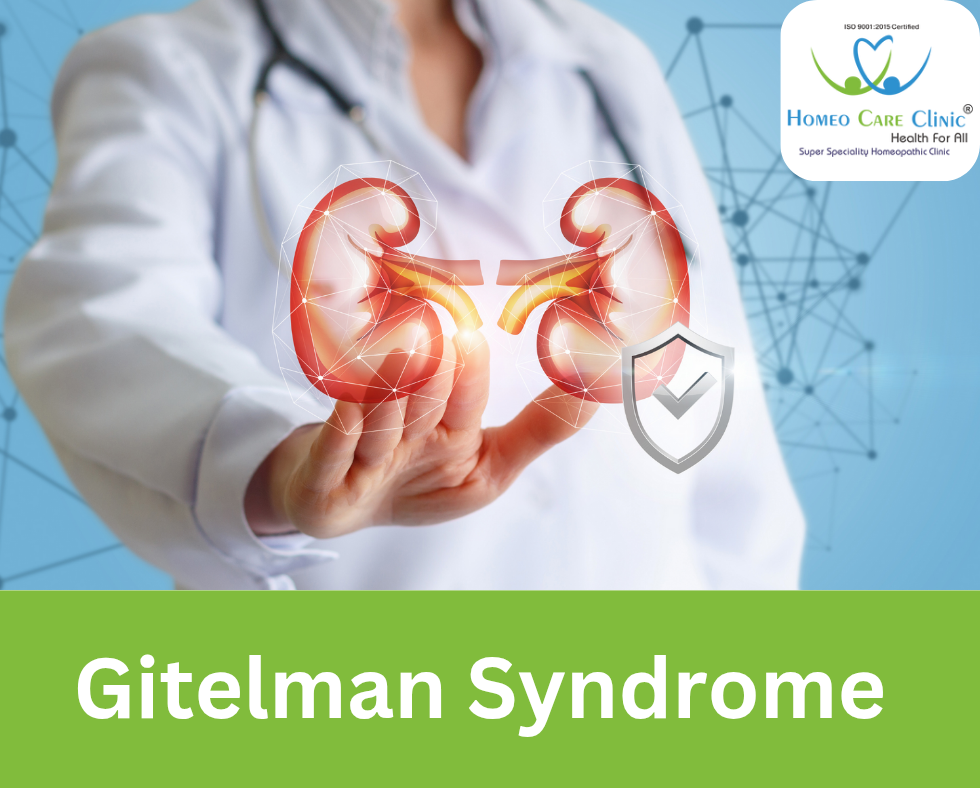Gitelman syndrome is a rare genetic disorder that affects the kidneys’ ability to properly reabsorb certain electrolytes. It is caused by mutations in the SLC12A3 gene, which affects the sodium-chloride cotransporter in the distal tubules of the kidneys.
Key Features of Gitelman Syndrome:
Electrolyte Imbalances:
Low potassium (hypokalemia)
Low magnesium (hypomagnesemia)
Low calcium in urine (hypocalciuria)
Metabolic alkalosis (elevated blood pH)
Gitelman Syndrome Symptoms
-Muscle cramps, weakness, and fatigue
-Salt cravings
-Numbness or tingling (paresthesia)
-Low blood pressure (hypotension)
-Increased urination (polyuria) and thirst (polydipsia)
-Heart palpitations (due to electrolyte disturbances)
Onset and Progression:
Symptoms usually appear in late childhood or adolescence.
It is generally less severe than Bartter syndrome, a similar kidney disorder.
Diagnosis:
Blood tests (to check potassium, magnesium, and pH levels)
Urine tests (low calcium excretion)
Gitelman Syndrome Causes
- Defective Sodium: Chloride Transporter: The mutation disrupts the normal function of NCC, leading to impaired sodium and chloride reabsorption.
- Increased Salt Loss: Since sodium and chloride are not properly absorbed, they are lost in the urine, leading to secondary electrolyte imbalances.
- Low Potassium and Magnesium Levels: Sodium loss in the urine stimulates the renin-angiotensin-aldosterone system (RAAS), increasing aldosterone levels.
- Low Calcium Excretion: Unlike Bartter syndrome, Gitelman syndrome is associated with hypocalciuria (low calcium in urine), which differentiates the two conditions.
Inheritance Pattern:
Autosomal recessive: Both parents must carry a mutated copy of the SLC12A3 gene for a child to inherit the condition.
Carriers (one mutated gene, one normal gene) typically do not show symptoms.
Homeopathy Treatment for Gitelman Syndrome
Homeopathic Approach
- Kali Phosphoricum – For muscle weakness, fatigue, and mental exhaustion.
- Calcarea Phosphorica – May be recommended for electrolyte imbalances and weakness.
- Natrum Muriaticum – Used in cases of dehydration, excessive thirst, and salt imbalance.
- Magnesia Phosphorica – Sometimes used for muscle cramps and spasms due to magnesium deficiency.
- Arsenicum Album – Suggested for fatigue, restlessness, and anxiety.
Important Considerations:
Electrolyte Monitoring: Gitelman syndrome requires medical supervision, with regular blood tests to monitor potassium, magnesium, and sodium levels.
Medical Treatment is Essential: The primary treatment involves potassium and magnesium supplements, dietary changes, and sometimes medications
like potassium-sparing diuretics.
FAQ’S –
- How is Gitelman syndrome diagnosed?
Blood tests: Low potassium (hypokalemia), low magnesium (hypomagnesemia), and metabolic alkalosis
Urine tests: Low calcium excretion (hypocalciuria)
Genetic testing: Confirms mutations in the SLC12A3 gene
- Is Gitelman syndrome life-threatening?
No, it is not usually life-threatening, but it can cause significant discomfort and long-term complications if not managed properly. Severe electrolyte imbalances can lead to heart problems or arrhythmias in rare cases.
- Can Gitelman syndrome be cured?
There is no cure, as it is a genetic condition. However, symptoms can be managed with proper treatment.
- What foods should be avoided?
Processed foods high in sodium (can worsen potassium loss)
Caffeinated beverages (increase urine output)
High-calcium foods (can interfere with magnesium absorption)
- Is Gitelman syndrome the same as Bartter syndrome?
No. While both are kidney disorders that cause electrolyte imbalances, Gitelman syndrome occurs in the distal tubule, while Bartter syndrome affects the loop of Henle. Gitelman syndrome usually has milder symptoms and low calcium in urine (hypocalciuria), whereas Bartter syndrome has normal or high calcium in urine (hypercalciuria).
- Can people with Gitelman syndrome live a normal life?
Yes! With proper treatment and lifestyle adjustments, most people with Gitelman syndrome can live a relatively normal life. However, they need to monitor electrolytes regularly and manage symptoms.
In conclusion, Homeo Care Clinic offers a holistic approach to treating Gitelman Syndrome. The remedies mentioned above can treat the underlying causes of the condition and offer relief from the discomfort. However, it is important to consult a qualified homeopathic practitioner for the correct dosage and duration of treatment. Homeo Care Clinic provides comprehensive care for various ailments and offers customized treatment plans based on individual requirements.
To schedule an appointment or learn more about our treatment, please visit our website or give us a call +91 9595211594 Our friendly staff will be happy to assist you. If you’re searching for the best homeopathy doctor, we are here to help.
Follow us on Facebook, Twitter, and Instagram for valuable insights into the world of homeopathy and holistic health.
Facebook – https://www.facebook.com/homeocareclinicpune
Instagram – https://www.instagram.com/homeocareclinic_in
Website – https://www.homeocareclinic.in
Chat with the best homeopathic doctor privately
If you have any queries regarding your disease or any symptoms, Click to send a WhatsApp message. Our best homeopathy doctor will be happy to answer you.
Book an Appointment
If you want to visit our clinic, Click to book an appointment.
Online treatment
If you are a busy professional, or you are living in a remote town or city, with no best homeopathic doctor near you, Clickhere to start an online homeopathic treatment with the world’s exclusive, most experienced, and best homeopathic clinic, managed by Dr. Vaseem Choudhary world-renowned homeopathic doctor






